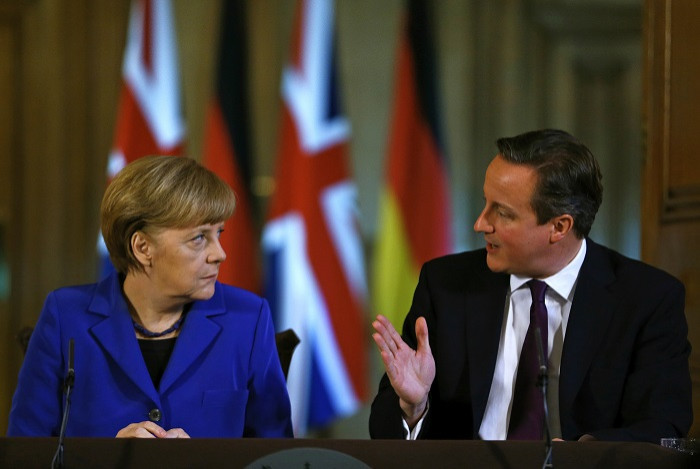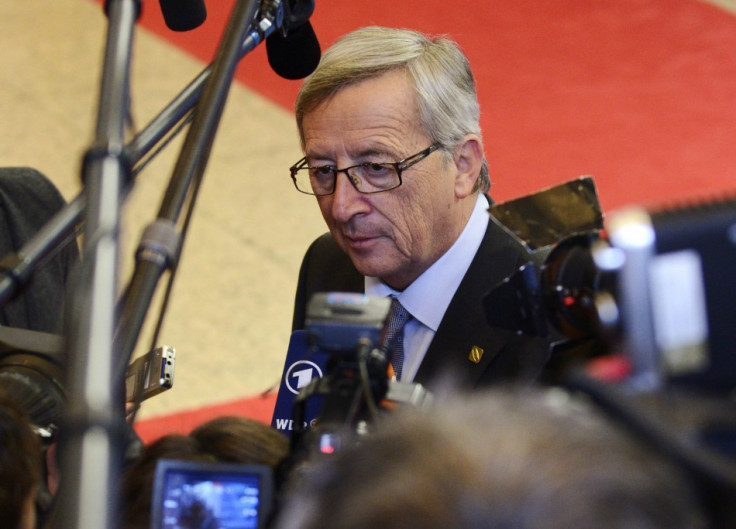Cameron's EU Chaos: Fresh Clashes With Merkel over Jean-Claude Juncker as Tory MEPs Go Rogue

David Cameron's European campaign has been pitched into fresh controversy after he once again found himself in head-on conflict with Germany's Angela Merkel, this time on two fronts.
First, he directly challenged her by placing a strongly-worded article in a number of European newspapers, including in Germany, driving home his campaign to stop federalist Jean-Claude Juncker becoming Commission president, and repeating his claim that it was an undemocratic stitch-up.
Then he failed to stop his own group in the Brussels parliament, the European Conservatives and Reformists (ECR), admitting German Eurosceptics opposed to Merkel's Christian Democrats.
The latest developments came only days after Merkel urged Cameron to stop issuing threats and making public pronouncements over his campaign to block Juncker, suggesting the more he publicly opposed him the more difficult it was for others like her to quietly compromise.
So she will be further infuriated by Cameron's latest public intervention and his allegations that she and others EU leaders were failing to "uphold the basic law" agreed by the EU.
But she will also be angered by the decision of the ECR to blatantly defy Cameron and allow MEPs from Alternative für Deutschland, into their Eurosceptic club.

Cameron has let it be known he is "very disappointed" the group has been admitted "against his wishes", but that won't do much to dampen Merkel's anger.
She had specifically opposed the move and will rightly deduce it suggests Cameron has no control over his own members of the European parliament.
The added irony is that Cameron created the group after pulling his Tories out of the European People's Party (EPP) of centre-right parties, including Merkel's Christian Democrats and the biggest in the parliament, because it was too Europhile, and to placate his own Eurosceptic MPs.
Now he is complaining that, having created a small breakaway group of sceptics, they have admitted other more hard-line sceptics.
Cameron also argues, in the article, that Juncker's nomination came about after the biggest groups in the parliament, including the EPP, did an undemocratic "back room deal" to select candidates for the Commission against the rules of the EU.
But by pulling out of the EPP, he had ensured his MEPs were no longer part of one of those big groups and were presumably left out of the back room dealing, which has always marked these appointments in the past.
The opening of a new front in Cameron's anti-Juncker campaign sparked both surprise and bemusement in Westminster with some Tory MPs convinced the prime minister's tactics are not only looking increasingly desperate, but are counter-productive.
Few doubt that Cameron believes the Euro elections showed the EU needs to reform if it is to regain any legitimacy, or that he is personally ready to lead the charge, and he has powerfully made his case both in public statements and in the article.
What has puzzled many in Westminster is why he appears to have gone out of his way to infuriate the key player in the saga, Germany's Angela Merkel, when earlier in the process there had appeared the possibility she might be open to persuasion.
By continuing such a high-level public campaign, Cameron risks pushing Merkel into such a tight corner that she has no room to escape and agree a compromise candidate.
The German media has turned on him, accusing him of "spreading poison" and being an obstructionist and, while this may all go down well at home with his Eurosceptic and Ukip-lite backbenchers, it can only weaken his position in future negotiations before that in-out referendum.
So this remains an extremely high-risk campaign for the prime minister. By showing his hand so publicly and so early in the process, if he fails to block Junker he will be painted as a failure with little real influence in the EU.
While success would be a huge boost to his credentials at home, particularly with his Eurosceptics, it could mean a significant setback to them in the EU, where he is pledged to seek to negotiate reforms before a promised referendum in 2017.
This is a battle Cameron really needs to win but, with each intervention, he appears to make that less likely.
© Copyright IBTimes 2025. All rights reserved.






















